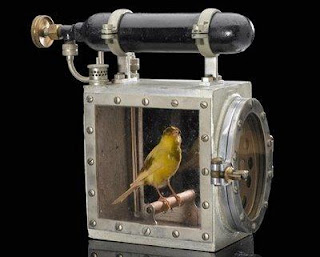We frequently refer to our regularly tested cattle, as 'canaries in the coalmine'. These tiny birds were taken into coal mines as an early warning system. Toxic gases such as carbon monoxide, methane or carbon dioxide in the mine would kill the bird before affecting the miners. Signs of distress from the bird indicated to the miners that conditions were unsafe due to the presence of gas.
So, if the canaries fell off their perches, it was time for the miners to leave. Quickly.
If cattle react to the skin test, they are sending a message that the bacteria which causes zoonotic Tuberculosis is around in the environment and available, not only to tested sentinel cattle, but any mammal..
From the NZ Farmer comes a much more sensible way of reacting to these 'biological markers' - [link] for a disease which may affect cattle or deer in a country which is heading for TB Free status in the very near future. In an area of New Zealand thought to be clear of TB, the disease has been found in wild pigs.
A survey of Marlborough's wild pig population is helping determine the extent of bovine TB in the region. Pig hunters have been contracted by OSPRI and Landcare Research to hunt in specific areas and collect pig heads for TB analysis since July. Lymph nodes under the neck of the animal can show that TB was evident in the region. Pigs contract TB by scavenging dead animal carcasses which have been infected, but do not pass on the disease themselves.In New Zealand, the wildlife vector of zTB is the brush tailed possum, so by checking wild pigs for disease, the authorities conclude:
"When TB is present in possums in an area, it is highly likely that it will also be present in local pigs. If we can pinpoint where disease is, we can be specific about possum control."And the New Zealand authorities do 'control' those possums. Whereas in the UK, we test the canaries ( cattle) and then shoot the messenger. Leaving the wildlife vector to run wild and free. Farm to farm.
Very sensible.



No comments:
Post a Comment